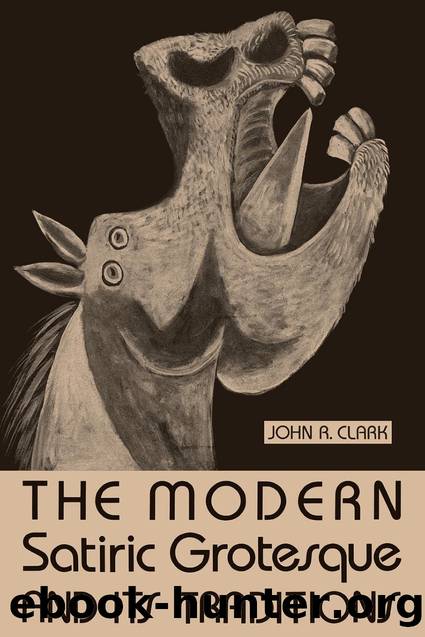The Modern Satiric Grotesque and Its Traditions by John R. Clark;

Author:John R. Clark; [Clark John R.]
Language: eng
Format: epub
ISBN: 9780813183312
Publisher: UP of Kentucky
Published: 2021-09-15T00:00:00+00:00
11
Scatology
Ennui may be unpleasant, but it is mild enough as a subject and usually bearable. The fecal matter of bowels and bowls, however, is more unsavory and offensive, and in polite society it is treated as forbidden knowledge. For that reason, the satirist cheerfully opens the privy door and herds us in. And of course we do not wish in the slightest to wet our feet. Therefore, satireâs business has ever been, where angels fear to tread, to inaugurate the unwary human readerâs total immersion. Further, in the twentieth century, satire goes to even greater lengths to see that such unsavory matter is nicely compacted and heavily compounded. What is satirically grotesque about such a subject is obvious: proud, self-delusional man ever aspires to elevate himself and his dignity, whereas the satirist destroys such upward mobility by reducing man to defecating animal before our eyes.
Aldous Huxley once contemptuously remarked that characters in Henry Jamesâs novels appeared so genteel that one doubted whether they were capable of going to the bathroom.1 But in most genresâepic, romance, tragedy, even comedyâno one ever does. Knights and private eyes, underdogs and overlords, kings and counselors rarely find time in fiction to eat, let alone secrete. The heroic and the middling modes endorse gentility; traditional decorum requires a moratorium upon topics intestinal or matters anal.
Indeed, the etiquette of polite society has always demanded restraint on a broad number of topics, particularly religion, politics, and sex. Alice and Kenneth Hamilton speak rather priggishly of sex, religion, and art as âthe Three Great Secret Things,â and Francis Bacon cautions against a too-great levity in conversation: âAs for jest, there be certain things which ought to be privileged from it; namely, religion, matters of state, great persons, any manâs present business of importance, and any case that deserveth pity.â2
We must concede, however, that the erstwhile heroes of satire are not only slain, like St. George, by their dragons, but they are also afflicted by questionable smells and very bad taste.3 Every satirist moves at once to break up furniture and to break in upon mores and conventions. Accordingly, religion, politics, and sexuality are the primary stuff of literary satire. Among these sacred targets, matters costive and defecatory play an important part. For what society normally considers low and sordid, as rhyparographic, are more frequently excretory than sexual. Many a man is willing to boast of his sexual prowess and caprice, but he is distinctly unwilling to tender public pronouncements about the size of his feces, the shape of his intestinal disorders, or the stature of his last bout with diarrhea. A man might be willing to look into another manâs sex life, but not into his stool. To be sure, the âodorsâ of sweat, urine, and manure coalesce to confer upon the evacuatory portion of our privy lives the more objectional flavor. One critic conjectures that the word smell implies âbad smell,â and society unites to repudiate stinks, owing to polite civilizationâs âcultural repudiation of decaying substances.â Ladies
Download
This site does not store any files on its server. We only index and link to content provided by other sites. Please contact the content providers to delete copyright contents if any and email us, we'll remove relevant links or contents immediately.
The Power of Myth by Joseph Campbell & Bill Moyers(925)
Half Moon Bay by Jonathan Kellerman & Jesse Kellerman(911)
A Social History of the Media by Peter Burke & Peter Burke(883)
Inseparable by Emma Donoghue(844)
The Nets of Modernism: Henry James, Virginia Woolf, James Joyce, and Sigmund Freud by Maud Ellmann(740)
The Spike by Mark Humphries;(719)
A Theory of Narrative Drawing by Simon Grennan(707)
The Complete Correspondence 1928-1940 by Theodor W. Adorno & Walter Benjamin(705)
Ideology by Eagleton Terry;(659)
Bodies from the Library 3 by Tony Medawar(649)
Culture by Terry Eagleton(646)
World Philology by(645)
Farnsworth's Classical English Rhetoric by Ward Farnsworth(641)
A Reader’s Companion to J. D. Salinger’s The Catcher in the Rye by Peter Beidler(614)
Adam Smith by Jonathan Conlin(608)
High Albania by M. Edith Durham(592)
Game of Thrones and Philosophy by William Irwin(592)
Comic Genius: Portraits of Funny People by(581)
Monkey King by Wu Cheng'en(577)
